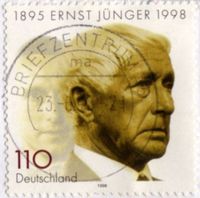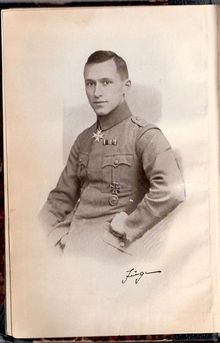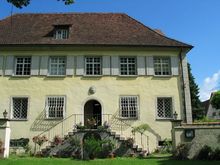| Ernst Jünger | |
|---|---|
 Ernst Jünger on a stamp | |
| Born | March 29, 1895 Heidelberg, German Empire |
| Died | February 17, 1998 (aged 102) Riedlingen, Germany |
| Nationality | German |
| Genres | Diaries, Novels |
| Subjects | War |
| Notable work(s) | In Stahlgewittern Auf den Marmorklippen |
| Notable award(s) | |
Ernst Jünger (March 29, 1895 – February 17, 1998) was a German writer. In addition to his novels and diaries, he is well known for Storm of Steel, an account of his experience during World War I. Many regard him as one of Germany's greatest modern writers and a hero of the conservative revolutionary movement following World War I. Others dismiss him as a militarist or reactionary.
Life And Work
Jünger was born in Heidelberg to a middle class family, and grew up in Hannover as the son of a chemical engineer who later became a pharmacist. He went to school between the years of 1901 and 1913 and was member of the Wandervogel movement. In 1913, he ran away from home to join the French Foreign Legion where he served very briefly in North Africa. During World War I he served with distinction in the Imperial German Army on the Western Front. In the first week of January 1917 he was awarded the Iron Cross First Class[1] and in September 1918 was awarded Prussia's highest military decoration of that time, the Pour le Mérite (informally known as the "Blue Max"). Received as a Lieutenant at the age of 23, he was the youngest soldier ever to be given this award.

His war experiences are first described in Storm of Steel (German title: In Stahlgewittern) which was published in 1920 (self-published). This book by which Jünger became suddenly famous has been seen as glorifying war. Jünger served as a lieutenant in the army of the Weimar Republic until his demobilisation in 1923. He studied marine biology, zoology, botany, and philosophy, and became a well-known entomologist. He married Gretha von Jeinsen (1906–1960) in 1925; they had two children, Ernst (1926–1944) and Alexander (1934–1993).
In the 1920s Jünger published articles in several right-wing nationalist journals, and further novels. As in Storm of Steel, in the book Feuer und Blut (1925, "Fire and Blood"), Jünger glorified war as an internal event. According to Jünger, war elevates the soldier's life, isolated from normal humanity, into a mystical experience.[2] The extremities of modern military techniques tested the capacity of the human senses.[3] He criticized the fragile and unstable democracy of the Weimar Republic, stating that he "hated democracy like the plague."[4] Although never a member of the National Socialist movement around Adolf Hitler, Jünger never publicly criticized the regime before the war. Jünger however refused a chair offered to him in the Reichstag following the Nazi Party's ascension to power in 1933, and he refused the invitation to head the German Academy of Literature (Die deutsche Akademie der Dichtung).[5] Even though he never endorsed the Nazi Party, and indeed kept them at a careful distance, Jünger's Storm of Steel sold well into the six-figure range by the end of the 1930s.[6] In the essay On Pain[7], written and published in 1934, Jünger rejects the liberal values of liberty, security, ease, and comfort, and seeks instead the measure of man in the capacity to withstand pain and sacrifice.
In 1927 he moved to Berlin. In 1929 was issued his The Adventurous Heart (German title: Das abenteuerliche Herz). In Über Nationalismus und Judenfrage (1930, "On Nationalism and the Jewish Question"), Jünger describes Jews as a threat for the unity of Germans. In 1932 he published The Worker (German title: Der Arbeiter), which called for the creation of a totally mobilized society run by warrior-worker-scholars. Jünger left Berlin in 1933, his house was searched by the Gestapo secret police, and from 1938 he was banned by the Nazis from writing. On the Marble Cliffs (1939, German title: Auf den Marmorklippen) uses metaphor to describe Jünger's negative perceptions of the situation in Hitler's Germany. He served in World War II as an army captain. Assigned to an administrative position in Paris, he socialized with prominent artists of the day such as Picasso and Jean Cocteau. His early time in France is described in his diary Gärten und Straßen (1942, Gardens and Streets).
Jünger appears on the fringes of the Stauffenberg bomb plot. He was clearly an inspiration to anti-Nazi conservatives in the German Army, and while in Paris he was close to the old, mostly Prussian officers who carried out the assassination attempt against Hitler. He was only peripherally involved in the events however, and in the aftermath suffered only dismissal from the army (summer of 1944), rather than execution.
His elder son Ernst Jr., then a Kriegsmarine cadet, was imprisoned that year for engaging in "subversive discussions" in his Wilhelmshaven Naval Academy. Transferred to Penal Unit 999, he was killed near Carrara in occupied Italy on November 29.
After the war, Jünger was initially under some suspicion for his nationalist past, and he was banned from publishing in Germany for several years by the British occupying forces for not resisting the Nazi regime enough.[6] His work The Peace (German title: Der Friede), written in 1943 and published abroad in 1947, marked the end of his involvement in politics. Rehabilitated by the 1950s, he went on to be regarded as a towering figure of German literature. German publisher Klett put out a ten-volume Collected Works (Sämtliche Werke) in 1965. The same publishers issued a second edition in 1983, turning Jünger into one of four German authors who lived to see two editions of his Collected Works published; the other three are Goethe, Klopstock, and Wieland.[8] He remained highly controversial, though, in the eyes of the German Marxist Left, both for his past, and his ongoing role as conservative philosopher and icon. Jünger was immensely popular in France, where at one time 48 of his translated books were in print.[9] In 1984, he spoke at the Verdun memorial, alongside with his admirers, French president François Mitterrand and German chancellor Helmut Kohl.[10]
His diaries from 1939 to 1949 were published under the title Strahlungen (1948, Reflections). In the 1950s and 1960s Jünger travelled extensively. His first wife, Gretha, died in 1960, and in 1962 he married Liselotte Lohrer. He continued writing prodigiously his entire life, publishing more than 50 books.
Jünger was among the forerunners of magical realism. His vision in The Glass Bees (1957, German title: Gläserne Bienen), of a future in which an overmechanized world threatens individualism, could be seen as science fiction. A sensitive poet with training in botany and zoology, as well as a soldier, his works in general are infused with tremendous details of the natural world. His critics claim there is an excess of emotional control and precision in his writing. In 1981 he was awarded the Prix mondial Cino Del Duca.
Throughout his whole life he had experimented with drugs such as ether, cocaine, and hashish; and later in life he used mescaline and LSD. These experiments were recorded comprehensively in Annäherungen (1970, Approaches). The novel Besuch auf Godenholm (1952, Visit to Godenholm) is clearly influenced by his early experiments with mescaline and LSD. He met several times with LSD inventor Albert Hofmann and they took LSD together. Hofmann's memoir LSD, My Problem Child describes some of these meetings.
One of his most important literary contributions was the metahistoric figure of the Anarch (sovereign individual), which evolved from his earlier conception of the Waldgaenger, or Forest Fleer. The anarch is Jünger's answer to the question of survival of individual freedom in a totalitarian world. It is developed primarily through the character of Martin Venator in his novel Eumeswil.[11]
Jünger's 100th birthday on March 29, 1995, was met with praise from many quarters, including the socialist French president François Mitterrand.
Jünger was a friend of Martin Heidegger. Jünger was admired by Julius Evola who published a book called L'Operaio nel pensiero di Ernst Juenger (1960), in which he summarized The Worker.
A year before his death Jünger converted to Catholicism and began to receive the Sacraments.
Ernst Jünger died on February 17, 1998 in Riedlingen, Upper Swabia, the last living bearer of the military version of the order of the Pour le Mérite.
His brother Friedrich Georg Jünger (1898–1977) was a poet and essayist. His younger son Alexander, a physician, committed suicide in 1993.
Despite the controversy surrounding his life, Jünger said he never regretted anything he wrote, nor would he ever take it back.[9]
Yet he joined Chancellor Helmut Kohl and President François Mitterrand of France at a 1984 Franco-German ceremony at Verdun, France, where he called the ideology of war in Germany before and after World War I "a calamitous mistake".[12]
Accusations of Fascism
Some critics of Jünger have derided him as a fascist.[13] Jünger never betrayed sympathy to the political style of "blood and soil" popular among the Nazis, but according to some of his critics his conservative literature made Nazism highly attractive.[14] The ontology of war depicted in Storm of Steel could be interpreted as a model for a new, hierarchically ordered society beyond democracy, beyond the security of bourgeois society and ennui.[15]
The writer and critic Walter Benjamin wrote a review/essay of War and Warrior, a collection of essays edited by Jünger. The title of Benjamin´s review, which was published in Die Gesellschaft 1930, is Theorien des Deutschen Faschismus (Theories of German Fascism), and it has been highly influential in its analysis of the relationship between aesthetics and politics.
In Fiction
- Ernst Jünger appears as a character in the 1974 French film Black Thursday
- He has a brief and marginal appearance in Jonathan Littell's docudrama Les Bienveillantes, where oddly he is derided as a Bolshevik by some of the character's associates.
- He makes brief appearances in Roberto Bolaño's Nocturno de Chile (By Night in Chile), La literatura nazi en América (Nazi literature in America), and 2666.
- He appears in Günter Grass's Mein Jahrhundert (My Century) in conversation with fellow German author Erich Maria Remarque.
References
- Bullock, Marcus. "Ernst Juenger." Encyclopedia of German Literature, Volume 2 J - Z, ed. Matthias Konzett. Chicago: Fitzroy Dearborn Publishers, 2000.
- Garland, Mary and Henry. "Ernst Juenger." Oxford Companion to German Literature, ed. by Mary Garland. Oxford: Oxford University Press, 1997.
- Garland, Mary and Henry. "In Stahlgewittern." Oxford Companion to German Literature, ed. by Mary Garland. Oxford: Oxford University Press, 1997.
- Huyssens, Andreas. "Fortifying the Heart Totally: Ernst Juenger's Armored Texts." New German Critique, No. 59 (Spring/Summer 1993): 3 - 23.
- Juenger, Ernst. Storm of Steel. Translated with an Introduction by Michael Hoffmann. London: Penguin, 2004.
Bibliography
- For an English listing, see:
- A complete listing:
Selected Works
- In Stahlgewittern, 1920 - Storm of Steel (ISBN 0865273103)
- Der Kampf als inneres Erlebnis, 1922
- Das Wäldchen 125 - Copse 125: A Chronicle from the Trench Warfare of 1918 (ISBN 0865273790)
- Feuer und Blut, 1925
- Das abenteuerliche Herz, 1929 - The Adventurous Heart
- Die totale Mobilmachung, 1931
- Der Arbeiter, Herrschaft und Gestalt, 1932
- Geheimnisse der Sprache, 1934
- Blätter und Steine, 1934
- Über den Schmerz, 1934 - On Pain (ISBN 9780914386407)
- Afrikanische Spiele, 1936
- Auf den Marmorklippen, 1939 - On the Marble Cliffs (ISBN 0140029850)
- Gärten und Straßen - 1942
- Myrdun. Briefe aus Norwegen, 1943
- Der Friede, 1947 - The Peace
- Atlantische Fahrt, 1947
- Sprache und Körperbau, 1947
- Ein Inselfrühling, 1948
- Heliopolis, 1949
- Strahlungen, 1949
- Über die Linie, 1950
- Der Waldgang, 1951
- Besuch auf Godenholm, 1952
- Der Gordische Knoten, 1953
- Das Sanduhrbuch, 1954
- Am Sarazenenturm, 1955
- Rivarol, 1956
- Serpentara, 1957
- Gläserne Bienen, 1957 - The Glass Bees (ISBN 0374521735)
- San Pietro, 1957
- Jahre der Okkupation, 1958
- An der Zeitmauer, 1959
- Sgraffiti, 1960
- Der Weltstaat, 1960
- Ein Vormittag in Antibes, 1960
- Das spanische Mondhorn, 1963
- Sturm, 1963
- Geheimnisse der Sprache, 1963
- Typus, Name, Gestalt, 1963
- Werke, 1961-1965 (10 vols.)
- Grenzgänge, 1966
- Subtile Jagden, 1967
- Im Granit, 1967
- Federbälle, 1969
- Annäherungen: Drogen und Rausch, 1970
- Ad hoc, 1970
- Lettern und Ideogramme, 1970
- Sinn und Bedeutung, 1971
- Die Zwille, 1973
- Zahlen und Götter; Philemon und Baukis, 1974
- Eumeswil, 1977 - Eumeswil (ISBN 0941419975)
- Sämtliche Werke, 1979 ff (18 vols.)
- Paul Léautaud in Memoriam, 1980
- Siebzig Verweht, 1980–81
- Flugträume, 1983
- Aladins Problem, 1983 - Aladdin's Problem (ISBN 070430208X)
- Author und Autorschaft, 1984
- Eine gefährliche Begegnung, 1985 - A Dangerous Encounter (ISBN 0941419371)
- Zwei Mal Halley, 1987
- Die Schere, 1990
Books About Jünger
- The Violent Eye: Ernst Jünger's Visions and Revisions on the European Right by Marcus P. Bullock (Wayne State University Press, 1992, ISBN 0814323340)
- The Details of Time: Conversations With Ernst Jünger by Julien Hervier (Marsilio Pub, 1995, ISBN 0941419959)
- Ernst Jünger and Germany: Into the Abyss, 1914-1945 by Thomas Nevin (Duke University Press, 1996, ISBN 0822318792)
- A Dubious Past: Ernst Jünger and the Politics of Literature After Nazism by Elliot Y. Neaman. (University of California, Berkeley, 1999. ISBN 0520216288)
- Ernst Jünger A Writer Of Our Time by J. P. Stern in the "Studies In Modern European Literature And Thought" Series (Bowes & Bowes, Cambridge, 1953)
- Ernst Jünger and the Nature of Political Commitment by R. Woods (Stuttgart, 1982)
- Ernst Jünger by Gerhard Loose. (ISBN 0805724796)
Notes
- ^ Jünger, Ernst Storm of Steel p. 119
- ^ Garland,p.437
- ^ Bullock,p.549
- ^ Hoffmann,p.vii
- ^ Hoffmann,p.viii
- ^ a b Hoffmann,p.x
- ^ English Translation
- ^ Hoffmann,p.xi
- ^ a b Hoffmann,p.xii
- ^ Hoffmann,p.xiv
- ^ See the special study Bernd A. Laska: 'Katechon' und 'Anarch'. Carl Schmitts und Ernst Jüngers Reaktionen auf Max Stirner. Nürnberg: LSR-Verlag 1997
- ^ David Binder "Ernst Junger, Contradictory German Author Who Wrote About War, Is Dead at 102", New York Times, 18 February 1998.
- ^ In France see Michel Vanoosthuyse, Fascisme et littérature pure, la fabrique d'Ernst Jünger, Agone, 2005, 330 pages, ISBN 9782748900422.
- ^ Huyssen, p.5
- ^ Huyssen,p.5

No comments:
Post a Comment